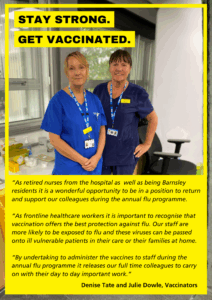Flu Vaccination: Protect Yourself and Your Patients
Official stats last published on: 18 January 2026
Getting your flu vaccination is one of the most important things you can do as a healthcare worker this winter. Check out autumn/ winter 2025/26 progress across the North East and Yorkshire below.

Fortnightly releases showing flu vaccinations and uptake for frontline healthcare workers started on 16 October and are published here: Statistics » Vaccinations: Flu
The challenge we’re facing
Flu vaccination rates among healthcare staff are declining. In 2024/25, less than 38% of NHS staff across England were vaccinated. In social care, rates were even lower — below 15% for care home staff.
Why flu vaccination matters
- Last winter, around 8,000 people died from flu in England.
- Vaccination prevented 96,000–120,200 hospitalisations.
- Healthcare workers are more likely to catch and spread flu.
- Even healthy people can have flu without symptoms and pass it on
How effective is the vaccine?
The flu vaccine:
- Makes symptoms milder and shorter if you do catch flu.
- Protects for up to 3 months after vaccination.
Take a look at the progress being made across our region — and hear directly from staff on why they chose to get vaccinated.
▼ Big #TeamCHFT effort sees 1,200 colleagues vaccinated against flu in just a week (9 Oct)
In just one week, almost 1,200 colleagues across Calderdale and Huddersfield NHS Foundation Trust have been given their flu vaccine. The vaccine has given them, the people they work with, care for, as well as family and loved ones, vital protection against flu this winter. Read more here.
▼ 10% of DBTH colleagues vaccinated against flu in first week of campaign (14 Oct)
Doncaster and Bassetlaw Teaching Hospitals (DBTH) has vaccinated 10% of colleagues against flu in just the first week of its annual winter vaccination campaign. To make it easy for colleagues to get protected, DBTH is offering regular drop-in clinics, roving vaccinators visiting wards and departments, and specially nominated colleagues within clinical areas who can vaccinate their own teams. Read more here.
▼ Red Kite View: helping lead the way on flu vaccinations (14 Oct)
Olivia White is one of 61 peer-to-peer vaccinators across Leeds and York Partnership NHS FT (LYPFT).
Flu vaccine uptake at Red Kite View has been an early success story the year at the trust – thanks largely to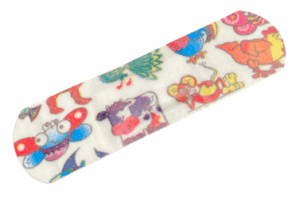 the enthusiasm and initiative of Olivia, the site’s peer-to-peer vaccinator.
the enthusiasm and initiative of Olivia, the site’s peer-to-peer vaccinator.
Last year, the site didn’t have a high uptake of the vaccine. This year, having Olivia on shift has made all the difference. “It’s so much easier when people can get the jab when it’s convenient, instead of having to book an off-site appointment,” Olivia explains.
She’s been sparking conversations across the team to raise awareness and tackle common myths. “There’s a lot of misinformation about the flu vaccine. I make sure people know what to expect – I’ve had mine, I felt fine, and I tell everyone that even if you do get mild side effects, they’re much better than getting the flu!”
Olivia has also found that small touches go a long way. “Everyone’s loved the CAMHS animal plasters – they’ve been a great icebreaker!”
Her message is clear: protecting yourself protects others. “Some people can’t have the vaccine, so it’s up to the rest of us to help protect those who are vulnerable. We all know how much strain flu season can put on services – this is one simple way we can all help.”
▼ Rotherham Doncaster and South Humber NHS FT’s strong start (14 Oct)
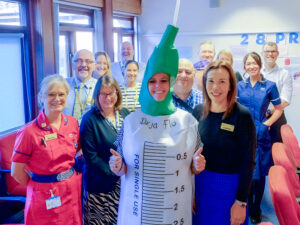 Rotherham Doncaster and South Humber NHS Foundation Trust (RDaSH) is making strong progress in its staff flu vaccination campaign this winter, having already vaccinated over a third of its workforce. This achievement reflects a significant collective effort across the trust, with teams working tirelessly to ensure vaccines are accessible and staff feel supported in making the decision to protect themselves and others. Senior leaders have played a key role, not only by publicly endorsing the campaign but also by leading by example—getting vaccinated themselves and encouraging their teams to follow suit.
Rotherham Doncaster and South Humber NHS Foundation Trust (RDaSH) is making strong progress in its staff flu vaccination campaign this winter, having already vaccinated over a third of its workforce. This achievement reflects a significant collective effort across the trust, with teams working tirelessly to ensure vaccines are accessible and staff feel supported in making the decision to protect themselves and others. Senior leaders have played a key role, not only by publicly endorsing the campaign but also by leading by example—getting vaccinated themselves and encouraging their teams to follow suit.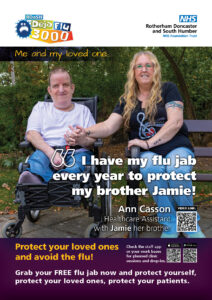
The trust’s communications strategy has been both creative and personal, helping to drive engagement and uptake. One standout initiative is the “Me and My Loved One” video and poster series, which features staff members sharing heartfelt reasons for getting vaccinated alongside a loved one or family member. These stories highlight the personal impact of flu protection and reinforce the message that vaccination is not just about individual health, but about protecting those closest to us. Through this blend of leadership, teamwork, and meaningful storytelling, RDaSH is setting a strong example in the fight against flu this winter.N
▼ Sheffield Health Partnership University NHS FT reports 10% rise one month in (31 Oct)
Sheffield Health Partnership University NHS FT has seen a 10% increase in staff flu vaccinations compared to the same time last year.
Mobile vans, twilight sessions, and site visits are making access easier than ever and there’s been a boost in engagement through videos featuring the chief pharmacist, Abiola Allinson and executive director of nursing, professions and quality, Caroline Johnson.
Weekly league tables, staff shout-outs, and screensavers are also helping drive the message through the organisation.
▼ Barnsley Hospital NHS Foundation Trust – Keeping up momentum (4 Nov)
Barnsley Hospital has made strong progress in this year’s flu vaccination campaign, with almost 40% of staff vaccinated already. This success is the result of a whole-team effort, driven by a shared commitment to protecting patients and colleagues.
Barnsley Hospital is proud of the progress made so far and remains committed to increasing uptake further as the campaign continues. They say the following key factors have contributed to the success so far:
- Collective Team Effort: Staff across departments have worked together to promote and deliver vaccinations.
- Dedicated Vaccinators: Vaccinators have gone above and beyond to ensure coverage across the trust. Meet nurses, Denise and Julie, by clicking on the image below.
-
Accessible Vaccination Options: Staff have been offered book-in clinics, roaming visits with senior leader presence, and drop-in sessions to make it easy to get vaccinated.
- Robust Communications Plan: Targeted messaging has helped raise awareness and encourage uptake.
- Advocacy-Led Content: The trust’s “I’m getting vaccinated because…” campaign features personal quotes and photos from staff at all levels, from board to ward, sharing their reasons for getting vaccinated. These stories have been shared across lock screens, intranet articles and the weekly digital staff magazine Proud News, creating emotional resonance and encouraging others to follow suit.
▼ Trusted voices help tackle flu myths
Many organisations like Humber Health Partnership and Bradford Teaching Hospitals are using respected clinical leaders to address common flu vaccine misconceptions. These trusted voices are helping build confidence and encourage uptake among staff.
In Bradford, messages will also be translated to better resonate with diverse teams. Here’s Dr. Yaseen Muhammad debunking some common myths:
▼ Meet the Flu Team powering HDFT’s vaccination drive (13 Nov)
Harrogate and District NHS Foundation Trust (HDFT) has made an impressive start to its flu vaccination campaign, with 54.3% of frontline staff already vaccinated. These figures reflect the massive team effort across the trust, who have a huge geography to cover due to their extensive 0–19 community services. Flu vaccinators from the Occupational Health & Wellbeing Service, often seen in striking branded T shirts, have made it easy for colleagues to get their jab by organising sessions on all wards/departments at the start of the campaign, bookable sessions in easy to access areas, by attending events and delivering roving sessions including some early morning, evening and at weekends. They have been supported with timely communication through directorates, promoting session details, and placing reminders and updates on the intranet and staff app to keep everyone informed and engaged.

▼ What makes Humber Teaching NHS FT one of the top performers in the country so far (27 Nov)
Humber Teaching NHS Foundation Trust is currently in the top 5 performing organisations across the country for frontline healthcare worker flu vaccination uptake (59.4% as of stats published on 27 November 2025).
The say the success of their campaign is attributable to a number of factors, including:
Communications
Key messages were used to focus on the benefits of being vaccinated. Headlines such as ‘Flu Stops With You’ and ‘Do it for them’ which highlighted the impact of being vaccinated on those more vulnerable people. Along with the consistent messaging, a ‘Flu Stops With You” video featuring the Director of Nursing and Medical Director has been shared with with staff.
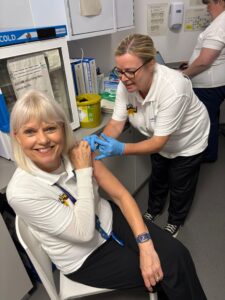 Senior Leadership involvement
Senior Leadership involvement
The Senior team attended events to highlight the importance of getting vaccinated. Chief Executive, Michele Moran, shared personal messages Trust wide, including a focus on how we can better protect children, both at home and in our services.
Dedicated team of vaccinators
Vaccinators were in attendance at staff events and peer vaccinators were able to support putting on additional clinics.
Simplified Booking Process
Following staff feedback last year, the trust streamlined the booking process for flu vaccinations. Colleagues no longer needed to register and book through a system. Instead, they could simply choose a date and time via an MS Teams calendar and enter their details to confirm. This also automatically added a reminder to their MS Outlook calendars.
On-Site Vaccination Events
The trust hosted two staff events, both attended by senior leadership, where colleagues could receive their flu vaccination. The locations were selected based on previous uptake levels, one with consistently high participation, and the other with historically lower engagement. To help create a welcoming atmosphere, refreshments were provided, pledge boards – as well as a photo opportunity with the ‘I’ve had my vaccination’ selfie board. Peer vaccinators and senior leaders proudly wore branded ‘Flu stops with you’ polo shirts throughout the events.
Read more about Humber Teaching NHS FT’s flu vaccination uptake drive on their website.

